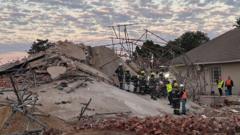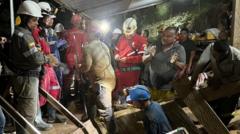In a desperate rescue operation, volunteers Mzwandile Mkwayi and Mandla Charles confronted the grim reality inside a South African mining shaft where illegal miners faced starvation and loss of life. Facing horrifying conditions, the volunteers emerged as heroes, stirring calls for systemic change in the context of illegal mining.
South African Miners Rescue: A Harrowing Tale of Survival and Sacrifice

South African Miners Rescue: A Harrowing Tale of Survival and Sacrifice
Volunteers descend into a South African mine where illegal miners faced dire conditions, leading to starvation and tragedy.
The rescue of trapped miners in a South African mine has unveiled a tragic tale of survival marked by desperation and loss. As volunteers Mzwandile Mkwayi and Mandla Charles descended the mineshaft, they were greeted with an overwhelming stench and a chilling sight. "Those bodies really smelled bad," remarked Mkwayi, highlighting the shocking reality of the scene as he revealed that some miners, facing starvation, resorted to cannibalism.
Mkwayi, who had previously served time for robbery, felt compelled to help after hearing the plight of those trapped with no food and limited hope. In what felt like an agonizing journey into darkness, he stated, "I felt very weak when I saw them," reflecting the pain of witnessing the frailty of those he sought to help. The miners, known locally as "zama zamas," had been abandoned after police operations aimed at curbing illicit mining intensified, surrounding shafts and preventing food from reaching them.
For weeks, the miners suffered, and many lost their lives to starvation, with disturbing accounts detailed in statements submitted to the high court. Mkwayi and his friend managed to rescue survivors who were emaciated and barely able to walk, with their efforts marked by an urgency to save lives. They utilized a cage designed for seven to lift out more than a dozen traumatized men, fearing that without their intervention, imminent death was likely.
Authorities had initially blocked attempts to assist the trapped miners, leading community members to intervene desperately by lowering ropes in a bid to provide aid. Following a court ruling, food was eventually sent down, but it came too late and in insufficient quantities. “We hold the view that the government has blood on its hands,” stated Magnificent Mndebele from the Mining Affected Communities United in Action group, connecting this tragedy with the earlier Marikana massacre and calling for accountability about the miners’ conditions.
The police strongly defended their approach to combating illegal mining, asserting that the intent was to address crime rather than humanitarian needs. Despite their efforts, questions arose about the timely intervention and available solutions. As information continues to unfold, Mkwayi's call for the government to legitimize artisanal mining to address systemic unemployment resonates deeply in a nation where many risk their lives for survival.
Mkwayi, who had previously served time for robbery, felt compelled to help after hearing the plight of those trapped with no food and limited hope. In what felt like an agonizing journey into darkness, he stated, "I felt very weak when I saw them," reflecting the pain of witnessing the frailty of those he sought to help. The miners, known locally as "zama zamas," had been abandoned after police operations aimed at curbing illicit mining intensified, surrounding shafts and preventing food from reaching them.
For weeks, the miners suffered, and many lost their lives to starvation, with disturbing accounts detailed in statements submitted to the high court. Mkwayi and his friend managed to rescue survivors who were emaciated and barely able to walk, with their efforts marked by an urgency to save lives. They utilized a cage designed for seven to lift out more than a dozen traumatized men, fearing that without their intervention, imminent death was likely.
Authorities had initially blocked attempts to assist the trapped miners, leading community members to intervene desperately by lowering ropes in a bid to provide aid. Following a court ruling, food was eventually sent down, but it came too late and in insufficient quantities. “We hold the view that the government has blood on its hands,” stated Magnificent Mndebele from the Mining Affected Communities United in Action group, connecting this tragedy with the earlier Marikana massacre and calling for accountability about the miners’ conditions.
The police strongly defended their approach to combating illegal mining, asserting that the intent was to address crime rather than humanitarian needs. Despite their efforts, questions arose about the timely intervention and available solutions. As information continues to unfold, Mkwayi's call for the government to legitimize artisanal mining to address systemic unemployment resonates deeply in a nation where many risk their lives for survival.




















